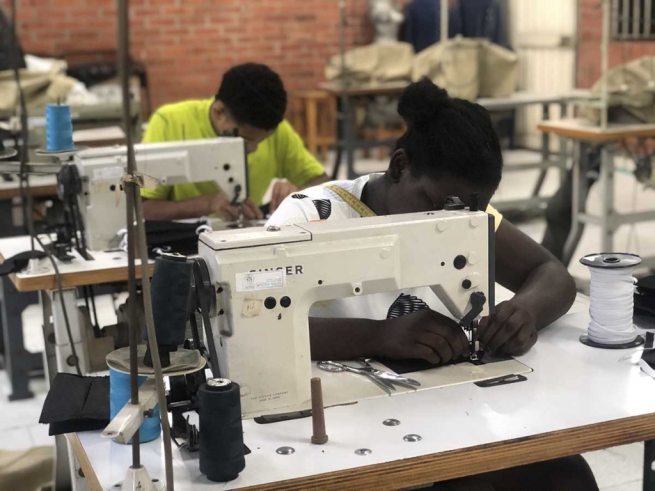In 2001, the U.N. Security Council sent a powerful message to the world that the recruitment of child soldiers would no longer be tolerated. Resolution 1379 requested the U.N. secretary-general attach an annex to his report on children and armed conflict, in which he would list parties to conflict who recruit and use children in situations on the U.N. Security Council’s agenda. Subsequent resolutions added four additional triggers for listing: sexual violence, killing and maiming, attacks on schools and hospitals, and abduction of children.
Salesian organizations around the globe give youth who have been recruited as child soldiers a chance at a better life. They offer shelter, counseling and education to gain the skills for later employment.
“Children utilized in hostilities and war have faced unimaginable violence and abuses and need our support to have a second chance in life,” said Father Michael Conway, director of Salesian Missions. “Salesian missionaries work with former child soldiers so that they may overcome the traumas of war and reintegrate into society.”
In honor of International Day Against the Use of Child Soldiers, Salesian Missions is proud to highlight programs that help child soldiers by offering education and psychosocial support.
COLOMBIA
Salesian missionaries are helping former child soldiers and at-risk youth in Colombia gain an education and have hope for the future. It is estimated that close to 6,000 minors are still utilized as child soldiers with thousands more having reached their 18th birthday after years of combat. In addition, the country’s guerrilla warfare has caused more than 300,000 deaths and fueled the growth of powerful drug cartels.
Don Bosco City, located in Medellín, has been working with youth for more than 55 years and has saved more than 1,300 from a life of violence. The long rehabilitation process at Don Bosco City focuses on three things youth need to learn — how to trust, to have hope for the future and to build relationships with others. Psychologists and teachers work together with youth, giving them the tools for a better future including basic education and more advanced skills training that will lead to stable employment.
Don Bosco City is one of the oldest and largest programs for street children in Latin America. Since its start in 1965, the program has rescued more than 83,000 boys and girls. Through the program, Salesian missionaries offer a multi-pronged approach designed to address the broad social issues that contribute to the poverty and exploitation these youth face while training them in the skills necessary to break the cycle of violence and poverty.
Another program focused on similar work is the Don Bosco Vocational Training Center (Don Bosco Center) in Cali. The Don Bosco Center provides a chance at rehabilitation for youth who have been ripped from their families at a young age to become soldiers.
LIBERIA
Operated by Salesian sisters, Mary Help of Christians School provides a foundation of education and support for young students who would otherwise have limited opportunities — many of whom are former child soldiers. The school started in 1993 and serves just over 560 students. The school also has a feeding program, which serves more than 100 students each day.
This is one of many schools that Salesian missionaries operate in Liberia. Salesians have been present in Monrovia since 1979 and manage parishes, youth centers, schools and oratories.
In 2019, Don Bosco Technical High School, also in Monrovia, launched a vocational training course for electro-technicians. An afternoon class is available to high school students, which complements their current educational path. There is also a morning class for young workers to help them obtain certification to improve their options in the workforce.
MALI
The Salesian Père Michael Training Center in Bamako, the capital and largest city of Mali, is bringing joy, providing education, and cultivating peace among children and older youth. The center keeps its doors open all day and provides support to hundreds of youth from the Niarela district and the outskirts of the city. It also works as a deterrent for children being recruited as child soldiers.
Youth come to the center to play sports, learn music or study at its library. The center provides a safe haven where youth have an opportunity to live, dream of a future, study, and learn the importance of being committed and collaborating in groups. They are able to express themselves freely and access the support of adults.
The goal is to keep young people, ages 12 to 25, away from the street and harmful habits such as alcohol or drugs. Instead, youth are offered an educational space during their free time which promotes cultural activities and allows the development of values. Salesian missionaries have been able to access sports equipment for the girls basketball team, set up a music training center, and organize health and hygiene awareness days to prevent diseases and promote a healthy lifestyle.


